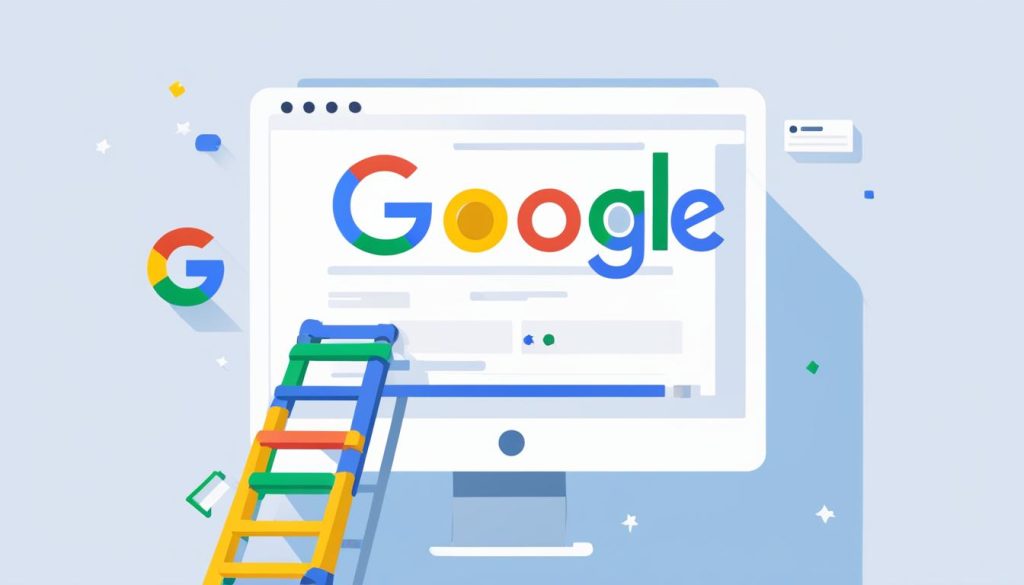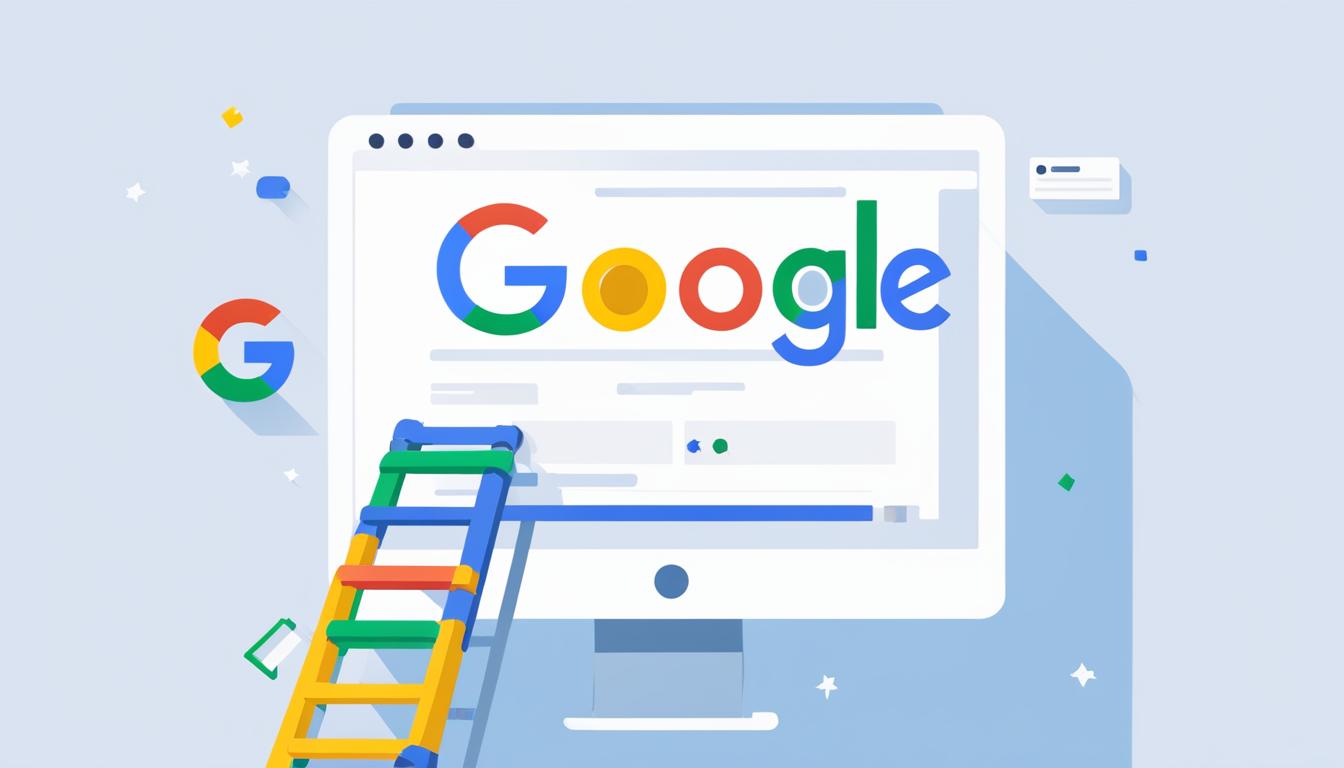Do you struggle with get your website on Google? It can be frustrating when you've spent time and resources creating a great website, yet you ask yourself “Why can't I find my website on Google??” It's a common problem, and the good news is that there are solutions to it get on Google and increase your visibility on Google. With a focus on search engine optimization (SEO) you can take important steps towards be visible on Google. We will guide you through, How can my website be visible on Google?, with the understanding of how Googlebot works.

Key points
- Understand the importance of proper indexing for visibility on Google.
- Identify the necessary steps to get your website indexed.
- Apply Google Search Console to monitor the status of your website.
- Learn how internal links can help Googlebot with crawling your site.
- Take proactive steps to overcome the common obstacles to indexing.
Introduction to Google SEO and website visibility
To understand the foundation of Google SEO and its impact on your digital presence is critical for any website owner. Without this, you may find yourself asking, 'why can't I find my website on Google?' Let's dive into the meaning of SEO and the indexing on Google to demystify the processes behind your website's visibility on the web.
Basics of Google's indexing process
Indexing on Google is the first step towards being discovered online and involves adding your website's pages to Google's extensive index. This ensures that your pages have the opportunity to appear in search results when a potential customer searches for relevant topics or services.
The importance of SEO for online visibility
Website optimization through SEO is not just a nice-to-have, but a necessity. It's about fine-tuning your content and technical aspects to ensure that Google not only understands, but also values your website, resulting in better rankings and increased traffic.
Google as the leading search engine and its role
Google continues to be the leading search engine and a primary source of web traffic. Your website's success depends on how well it plays by Google's rules; from the speed and mobile friendliness of the pages to the quality of the content you offer. To master Google SEO is therefore not a question, but an answer to how you make your website visible and appealing to both Google and your visitors.
Understanding Google's web crawlers and their importance to your website
When you dive into the universe of google search engine optimization, you inevitably come across the meaning of web crawlers, especially Googlebot. These automated robots are constantly on the lookout for new content and play a key role in how your website is found and rated by Google. But how do you work with the web crawlers to promote your website in the search results? Here's an insight that may be to your advantage.
Imagine web crawlers like friendly spies navigating the maze of internet content. Their mission is simple: to find, index and rank your digital content. By making a few smart moves on your website, you can make their job easier – and in the process improve your ranking on Google.
You are probably asking, "How do I invite these Googlebots onto my website?" The answer lies in the construction and maintenance of strong internal link structures and regular updates of content, which together ensure that the web crawlers discover and value your pages.
- Highlight important pages with internal links to guide the web crawlers.
- Update and create relevant content that encourages repeat crawl visits.
- Optimize your meta tags to give web crawlers clear signals about the relevance of your content.
To give you a more tangible understanding, let's take a look at how popular websites might look to a web crawler:

| Element | Meaning for Webcrawler |
|---|---|
| Internal Links | Paths leading to important content |
| Fresh Content | Ongoing reasons for revisits |
| Meta tags | Clear markers for the content's relevance |
Increased website popularity and regular updates act as an invitation for more visits from these industrious robots. The more content you have that is frequently updated and properly interlinked, the easier it is for web crawlers to find information on your website, potentially increasing your visibility on Google huge.
Remember: Google rewards those who help its robots navigate and understand its websites. The web crawlers are your allies in the fight for visibility on the web!
Complete guide: How to get your website indexed by Google
Getting your website indexed by Google is a crucial factor in improving your online visibility and improve google ranking. First of all, it is necessary to ensure that your website is ready to be crawled and indexed by Google's robots. This involves a few essential steps that you should follow closely to achieve the best results.
Step-by-step process to promote indexing
The process of getting Google to notice and index your website begins with some basic but important steps:
- First, make sure your site's content is publicly available and not blocked by files like robots.txt.
- Next, use Google Search Console to request a crawl of your website.
- Install a user-friendly and responsive website design, as this can affect how often and how effectively Googlebot visiting your pages.
Following these steps can help your site be discovered by Google faster, and thus be indexed more effectively.
The importance of XML sitemaps in the indexing process
If you are wondering What is an XML sitemap?, in short, it is a file that helps Google understand the structure of your website. It acts as a map for search engines, showing all the available pages and content, making it easier for Google to crawl your website efficiently. Creating and submitting an XML sitemap via Google Search Console, especially if your site is large or has a complex structure.
Keep in mind that a well-structured XML sitemap can be the key to faster and more complete indexing of your site.
Tips for faster indexing of your website
To further accelerate the indexing process, you can apply these helpful tips:
- Be sure to regularly update your site with fresh and relevant content, as Google favors sites that are active and up-to-date.
- Build a strong structure of internal links so Googlebot can easily navigate and index new and updated pages.
- Avoid duplicate content as it can confuse search engines and potentially hinder the indexing of your pages.
By following these tips, you can help your website quickly climb up the search results and achieve a better position on Google.
Troubleshooting: Why is my website not on Google?
If you encounter the frustrating problem, Why is my website not on Google?? This can be disconcerting, especially when you have invested time and resources into your online presence. There are several factors to investigate that may give you an answer to the problem.
First, it is worth conducting a simple site search on Google by typing site: dinwebside.dk in the search field. If this shows no results, it may be because your website is new and has not yet been indexed. Patience is the key here, but you can also encourage Google to crawl your site faster by submitting your sitemap to Google Search Console.
A common reason for non-indexing can be the presence of noindex-tags on your web pages. These instruct the search engines not to include specific pages in the indexes.
Examine your website's source code to ensure that noindex-tags do not block indexing.
Misconfiguration of robots.txt and .htaccess files can also prevent Google from indexing your site correctly. These files can instruct search engine crawlers to ignore entire sections of your website, resulting in a lack of visibility.

Below is a checklist to help you identify and solve common problems:
| Problem | Potential Cause | Solution |
|---|---|---|
| The website does not appear in searches | New website, lack of indexing | Submit sitemap via Google Search Console |
| Noindex tags on pages | Error in the page's code | Remove noindex-tags and request re-indexing |
| Blocked by robots.txt | Configuration error in file | Fixing robots.txt to allow crawling |
| Blocked by .htaccess | Configuration error in server settings | Fixing .htaccess minimizes server restrictions |
Remember that it is important to comply with Google's guidelines for indexing. Violation of these can result in penalty or exclusion from the index, which can have a long-term negative effect on your website's visibility.
Are you still unsure? Why is my website not on Google?, it may be a good idea to seek professional help. SEO experts can offer in-depth analyzes and tailored solutions that will get your website back on track.
Google SEO: How to optimize your website to be found?
To understand Google SEO is essential for you who want to ensure that your website not only exists, but also appears attractive in Google's eyes. Before we dive into the technical aspects, it's important to recognize that your overall approach to SEO is going to shape the traffic you attract.
On-page and off-page SEO factors
On-page and off-page SEO are two sides of the same coin; both are crucial for search engines to find and rank your website effectively. On-page, also known as on-page SEO, deals with all the content found directly on your website and how this is optimized for both search engines and visitors. Off-page SEO refers to the external factors such as backlinks and social media's impact on your website's authority and credibility.
Keyword research and content strategies
Keyword research forms the cornerstone of your SEO strategy. Keywords or search phrases are the terms that your potential visitors enter into search engines. By understanding and applying these to your website content, you can improve your chances of being found. A well-developed content strategy uses this research to create relevant and engaging content that attracts and retains users' attention.
Mobile optimization and the importance of user-friendliness for SEO
In an age where more and more people access the internet via mobile devices, can mobile optimization not be underestimated. Google prioritizes mobile-friendly pages, which means that your website must be easy to navigate and read on smaller screens. Ease of use is closely related to mobile optimization, as it ensures that visitors have a positive experience on your website, which also signals quality to the search engines.
Technical errors and how they affect your website's ranking on Google
It is no secret that technical errors on your website can lead to bad website ranking on Google. Factors such as server performance, load times and proper use of redirects have a big impact on how well your website performs in search results.

To help you better understand how these errors affect your website and what you can do to prevent them, we've put together an overview of the most common technical issues:
| Problem | Effect | Solution |
|---|---|---|
| Poor server performance | Slow load times can hurt user experience and search engine rankings | Optimize your hosting solution, consider a dedicated server environment |
| Slow loading times | Reduces the likelihood that users and Googlebot will wait for your content | Minimize file sizes, use browser cache and improve server response time |
| Bad redirect strategies | Can confuse search engines and lead to loss of valuable page authority | Make sure to use 301 redirects correctly to preserve link juice |
| Deficient robots.txt files | Incorrect settings can prevent Googlebot from crawling your page effectively | Check and reformulate your robots.txt to ensure correct access for search engines |
A regular overhaul of your website to address these technical errors will not only improve your website ranking on Google, but it will also ensure a better experience for your users. Remember that a sound technical foundation is key to creating a strong online presence.
The use of Google Search Console for website analysis
When you want to optimize your website and secure better visibility on Google, is Google Search Console an invaluable tool. This platform gives you an in-depth understanding of your website's current SEO status and how you can improve it. Here's how Google Search Console can become an integral part of yours website analysis.
Check the indexing status of the website
With Google Search Console, you can quickly check whether all your pages are indexed by Google. By navigating to the 'Indexing Status' section, you get an overview of which pages are available to users in the search engine results.
Identifying crawl errors and solutions
Crawl error can be a barrier to your website's visibility. Google Search Console helps identify these errors as well as suggest effective solutions to ensure your website is easily crawled and indexed.
Understanding reports and data to improve SEO
Through various reports, Google Search Console provides information about search analysis, links to your website, and much more. Understanding and applying this data is critical to improving your website's SEO strategy.
| Metric | Importance | Action |
|---|---|---|
| Total number of clicks | The number of times someone has clicked on your website from Google search results | Analyze which pages attract the most clicks and optimize them for even better performance |
| Page read time | The time it takes for your website to fully load | Optimize image sizes and minimize code for faster load times |
| Internal links | Number of links on your website that point to other pages within the same domain | Make sure important content has enough internal links to improve crawlability |
| Mobile usability | How well your website performs on mobile devices | Fix any errors to ensure a good user experience on mobile devices |
Link building: External links and their effect on your Google ranking
To master the art of link building can be the key to unlocking a prime ranking on Google. This is due to external links acts as a voice on the web, signaling your website's relevance and authority. For every quality link your website receives, Google takes this as a sign that your content is valuable, improving your visibility in search results.
It is important to understand that not all links are created equal. Google prioritizes links from credible and relevant sources, which means that a link from a recognized website in your industry weighs heavily on SEO-scale. think about link building as network building; the stronger the network, the greater authority is attributed to your website.

Here are some strategies you can use to obtain qualityexternal links:
- Create in-depth, valuable content that naturally attracts links.
- Guest blogging on respected websites within your niche.
- Develop relationships with influencers and other websites that can mention your website.
- Using social media to promote your content and create awareness.
Link building is not a one-off event, but a continuous effort. By consistently engaging in these practices, you can ensure a stream of high-values external links, which will support your website's SEO and make it more visible to your target audience on the internet.
Server-side tracking and future SEO without third-party cookies
With the announced abolition of third-party cookies by Google, webmasters are now seeking courage server-side tracking as a robust solution for collecting data. This approach focuses on catching up first party data, which is data collected directly from the users on your own domain. This method of data tracking strengthens data security and complies with GDPR, increasing both confidentiality and reliability of data collection.
The new guidelines bring significant shifts in the world of SEO, which require innovative strategies to remain effective. Here comes Google Privacy Sandbox into the picture, an initiative that proposes technologies that both protect user privacy and allow advertisers to target.
The shift to first-party data and its impact on SEO
In line with that first party data becomes the new norm in the digital marketing world, SEO practitioners must adjust their tactics. Websites must optimize the user experience to motivate visitors to share their data voluntarily, while respecting them as a valuable resource for personalized marketing and relevant search results.
Effective alternative tracking techniques for third-party cookies
Alternative methods such as fingerprinting and server-side session capture are growing in popularity as server-side tracking- techniques. These methods give website owners access to valuable user behavior without compromising privacy, redefining the approach to gaining insights and executing data-safe marketing.
Adjustment of SEO strategies in light of Google's Privacy Sandbox
In order to adapt to these changes, as an SEO specialist you should delve into the possibilities within Google's Privacy Sandbox. It's about finding a balance: maintaining effective advertising campaigns while protecting user privacy. These conditions will increasingly shape the SEO strategies of the future, where transparency and user protection will become decisive competitive parameters.
| Measurement method | Privacy protection | Data quality | GDPR compliance |
|---|---|---|---|
| Server-side tracking | High | High | Yes |
| Third party cookies | Low | Medium | No |
| Fingerprint | Medium | Medium | Yes, with reservations |
Conclusion
We have now taken you through an in-depth look at how you can improve online visibility and ensure an effective website optimization for Google. The most important takeaway is that SEO is not just about one-off techniques, but about a constant iterative process. From carefully selected keyword strategy, to the use of web crawlers and correction of technical errors, all aspects are essential to ensure your website's accessibility and success online.
With the development of technology and Google's updates, it becomes more and more clear that we have to get used to the shift towards first party data and adapt our strategies accordingly. It will not only optimize your website's position in search engines, but also create a more secure and private experience for your users. It is your commitment and attention to these details that will shape the future of your SEO success.
In an age where digital presence can make or break businesses, staying up-to-date with the latest SEO practices is of the utmost importance. By applying the strategies and methods discussed, you cannot alone improve online visibility, but also create a strong and lasting position on Google, which will take your online presence to new heights.
FAQ
How can I get my website on Google?
You can get your website on Google by making sure it is accessible to Google's web crawlers. This can be done by checking the robots.txt file to ensure that it is not blocking Googlebots and by submitting your XML sitemap via Google Search Console to help speed up the indexing process.
Why can't I find my website on Google?
There can be several reasons why you cannot find your website on Google. It could be that the website is new and has not been indexed yet, or that there are technical problems that block Googlebots from crawling and indexing your site. It can also be due to the quality of your content or violation of Google guidelines.
How does my website become visible on Google?
To be visible on Google, you need to focus on SEO optimization of your website, which includes both on-page and off-page factors, relevant and high-quality content, and to ensure that your site is mobile-friendly. Also use Google Search Console to monitor and improve your website's presentation in search results.
What is the importance of SEO for online visibility?
SEO, or search engine optimization, is critical to online visibility as it helps your website rank higher in search results on Google. It makes it easier for potential customers to find your business online and can increase both traffic and conversions.
Why is it important to use Google as a search engine for my website's visibility?
Google is the leading search engine and accounts for the vast majority of search traffic on the web. By optimizing your website for Google, you can tap into this huge source of potential visitors and ensure your business reaches a wide audience.
How do Google's web crawlers work?
Google's web crawlers, known as Googlebots, scan the web for new and updated pages by following links. They analyze the content of the pages and index it so that it can appear in Google's search results. Effective internal links and regularly updated content can help attract these crawlers to your site.
What is an XML sitemap and how do I use it to improve indexing on Google?
An XML sitemap is a file that lists all the important pages on your website in order to make it easier for Google to find and crawl them. You can create an XML sitemap and submit it to Google via Google Search Console to help ensure that all your pages are indexed.
How do I identify crawl errors and how do I fix them?
You can identify crawl error using Google Search Console, which will report any problems Google has accessing your page. These errors can be solved by addressing the specific challenges, such as to fix dead links or server errors, and ensure proper configuration of the robots.txt file.
What role do external links play in my website's ranking on Google?
External links act as 'votes' for your website and are a strong indicator for Google of your site's reliability and authority. Websites with high quality and relevant backlinks tend to rank better in search results. Link building should be a key component of your SEO strategy.
How will Google's Privacy Sandbox and the changes with first-party data affect my SEO?
With the phasing out of third-party cookies, Google plans to implement Privacy Sandbox technologies that will allow targeted and effective marketing with less available user data. SEO practitioners will likely consolidate focus on first party data and content marketing, and companies must adapt their strategies to remain effective with more privacy-friendly methods.

